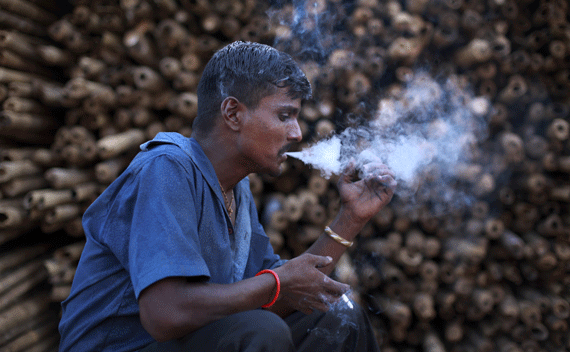Guest Post: Bollyky on Tobacco and Trade

President Obama’s decision to pursue the Trans-Pacific Partnership trade talks has created a political problem for the White House. The tobacco industry wants the administration to push Asian countries to open up their markets to its products. Public health advocates note that the White House has endorsed next month’s United Nations summit on non-communicable diseases and are calling on the administration to discourage tobacco use abroad as well as at home. Thomas J. Bollyky, CFR’s new senior fellow for global health, economics, and development, just completed a CFR Policy Innovation Memorandum entitled Forging a New Trade Policy on Tobacco. I asked Tom to explain what’s at stake in the debate and how the White House might reconcile trade imperatives with global public health goals. Here is what he had to say.
More on:
Tobacco is reemerging as a polarizing issue in U.S. trade policy. Last month, Representative Linda Sanchez (D-CA) circulated a letter demanding that the Office of the U.S. Trade Representative (USTR) exclude tobacco entirely from its eight-country Trans-Pacific Partnership (TPP) trade talks. Philip Morris asked USTR to use these TPP talks to eliminate tobacco tariffs and block the use of large health warning labels on cigarette packs. The U.S. Chamber of Commerce has joined in, supporting the tobacco industry’s efforts on labeling.
It is unclear how U.S. officials will proceed, but the stakes are high. The position that the White House adopts on tobacco will set the precedent for future U.S. trade agreements.
A decision to exclude tobacco entirely will incite active TPP opposition from the tobacco industry and perhaps some international business groups. With the sluggish U.S. economy and the 2012 presidential election looming, the Obama administration is looking to the TPP talks to improve its trade credentials and standing among the business community. Tobacco is a legal product and the United States is its largest exporter.
With the global health community focused on the UN Summit and the global epidemic of non-communicable diseases (NCDs), U.S. trade policies on tobacco will receive heightened scrutiny. Tobacco is different from alcohol, fast food, and other NCD risk factors. As former WHO Director-General Gro Harlem Brundtland famously said, tobacco is the only consumer product which, when used as directed, kills. How can the United States promote further trade in tobacco products when they already cause more deaths annually than HIV/AIDS, malaria, and TB combined?
More on:
The way forward
The United States need not exclude tobacco from the TPP talks to promote tobacco control. U.S. negotiators should pursue the following four-part strategy to balance U.S. trade interests with tobacco control priorities.
1. Reduce Subsidies. Lower agricultural subsidies for tobacco would level the playing field for U.S. tobacco producers, which are no longer subsidized, and help diminish foreign production.
2. Harmonize Regulations. The United States should coordinate with TPP partners on adopting strong tobacco labeling and content restrictions. Common requirements promote trade and effective tobacco regulation, and limit trade disputes.
3. Make health exception for tobacco control explicit. An explicit exception for tobacco control would limit the ability of tobacco companies to abuse TPP dispute resolution to block effective advertising and labeling measures.
4. Exclude Vietnam from tobacco tariff reductions. Entry of multinational tobacco companies and marketing tactics into Vietnam, a lower-income country participating in the TPP talks, would be disastrous. Lower tariffs reduce the price of imported cigarettes in countries like Vietnam that lack good taxation systems to compensate. Cigarette labeling requirements in Vietnam do not yet apply to imported products. The tobacco industry is increasingly targeting women in Asia as a growth market. Less than two percent of Vietnamese women smoke.
The Obama Administration has a tremendous opportunity to support U.S. trading partners’ efforts to protect their citizens from tobacco without an attendant cost to U.S. jobs and consistent with U.S. trade precedents. The above strategy, described further here, provides the way to do so.
 Online Store
Online Store
